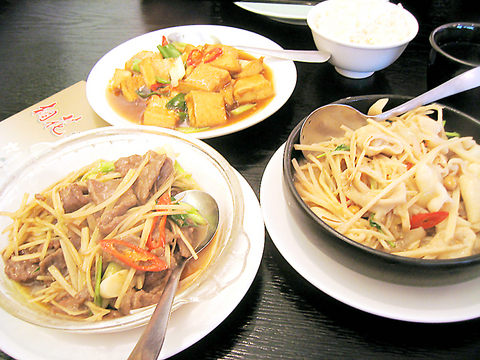You may cringe at the idea of munching on entrails, but if you chose to visit a Hakka restaurant and opt to do it right, then there is no way to avoid the chewy tubular delicacy. In fact, many might go so far to say that if you don't order pig intestines then you may as well not have bothered going to a Hakka joint at all.
If you've never eaten Hakka fare and feel intimidated by all this talk of innards and entrails, yet still have a whim to try it out, then any one of the six branches of Taipei's leading Hakka restaurant chain, Chinese Hakka Cuisine (桐花客家科理), is probably the best place to begin.
While there is certainly no shortage of Hakka restaurants in Taipei, not all of them boast the same high standard of cleanliness and quality of fare as those offered at all branches of the popular Hakka chain.

PHOTO: GAVIN PHIIPPS, TAIPEI TIMES
For almost a year now, the chefs at the Mingsheng East Road branch, which is the latest addition to an ever-increasing chain, have been cooking up a storm with their fine Hakka-style cuisine.
Unlike many a Hakka-styled eatery, the interior is not awash with tacky traditional Hakka garb and paraphernalia ranging from straw clothing to farming implements. Instead, the newest branch boasts a plain and contemporary interior design, which makes good use of natural light and a predominately black and white color scheme.
More importantly, however, the cost of chowing down at Chinese Hakka Cuisine will not break the bank. Dishes range from NT$150 to NT$540, and the average cost of a meal for two won't set you back more then NT$1,000.
Those with little or no Chinese language ability should not be intimidated by the fact that there are no English menus at any of the branches of Hakka Chinese Cuisine. The wait staff doesn't balk at the sight of foreigners, they are always polite and are only too happy to introduce the dishes and, if need be, even set diners up with a made to order meal.
Regardless of what you choose to dine on at these classy Hakka locales, the essence, flavors and fusion of spices such as garlic, ginger, shallots, basil and star anis will leave you hankering for a return visit.

The unexpected collapse of the recall campaigns is being viewed through many lenses, most of them skewed and self-absorbed. The international media unsurprisingly focuses on what they perceive as the message that Taiwanese voters were sending in the failure of the mass recall, especially to China, the US and to friendly Western nations. This made some sense prior to early last month. One of the main arguments used by recall campaigners for recalling Chinese Nationalist Party (KMT) lawmakers was that they were too pro-China, and by extension not to be trusted with defending the nation. Also by extension, that argument could be

Aug. 4 to Aug. 10 When Coca-Cola finally pushed its way into Taiwan’s market in 1968, it allegedly vowed to wipe out its major domestic rival Hey Song within five years. But Hey Song, which began as a manual operation in a family cow shed in 1925, had proven its resilience, surviving numerous setbacks — including the loss of autonomy and nearly all its assets due to the Japanese colonial government’s wartime economic policy. By the 1960s, Hey Song had risen to the top of Taiwan’s beverage industry. This success was driven not only by president Chang Wen-chi’s

Last week, on the heels of the recall election that turned out so badly for Taiwan, came the news that US President Donald Trump had blocked the transit of President William Lai (賴清德) through the US on his way to Latin America. A few days later the international media reported that in June a scheduled visit by Minister of National Defense Wellington Koo (顧立雄) for high level meetings was canceled by the US after China’s President Xi Jinping (習近平) asked Trump to curb US engagement with Taiwan during a June phone call. The cancellation of Lai’s transit was a gaudy

The centuries-old fiery Chinese spirit baijiu (白酒), long associated with business dinners, is being reshaped to appeal to younger generations as its makers adapt to changing times. Mostly distilled from sorghum, the clear but pungent liquor contains as much as 60 percent alcohol. It’s the usual choice for toasts of gan bei (乾杯), the Chinese expression for bottoms up, and raucous drinking games. “If you like to drink spirits and you’ve never had baijiu, it’s kind of like eating noodles but you’ve never had spaghetti,” said Jim Boyce, a Canadian writer and wine expert who founded World Baijiu Day a decade